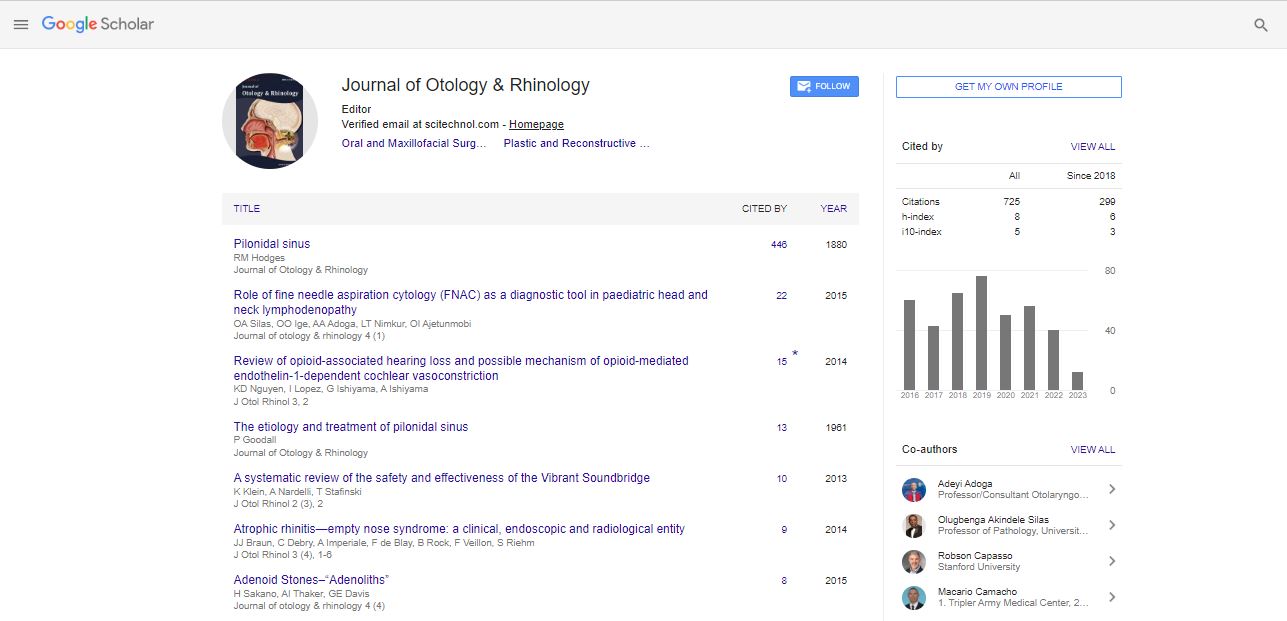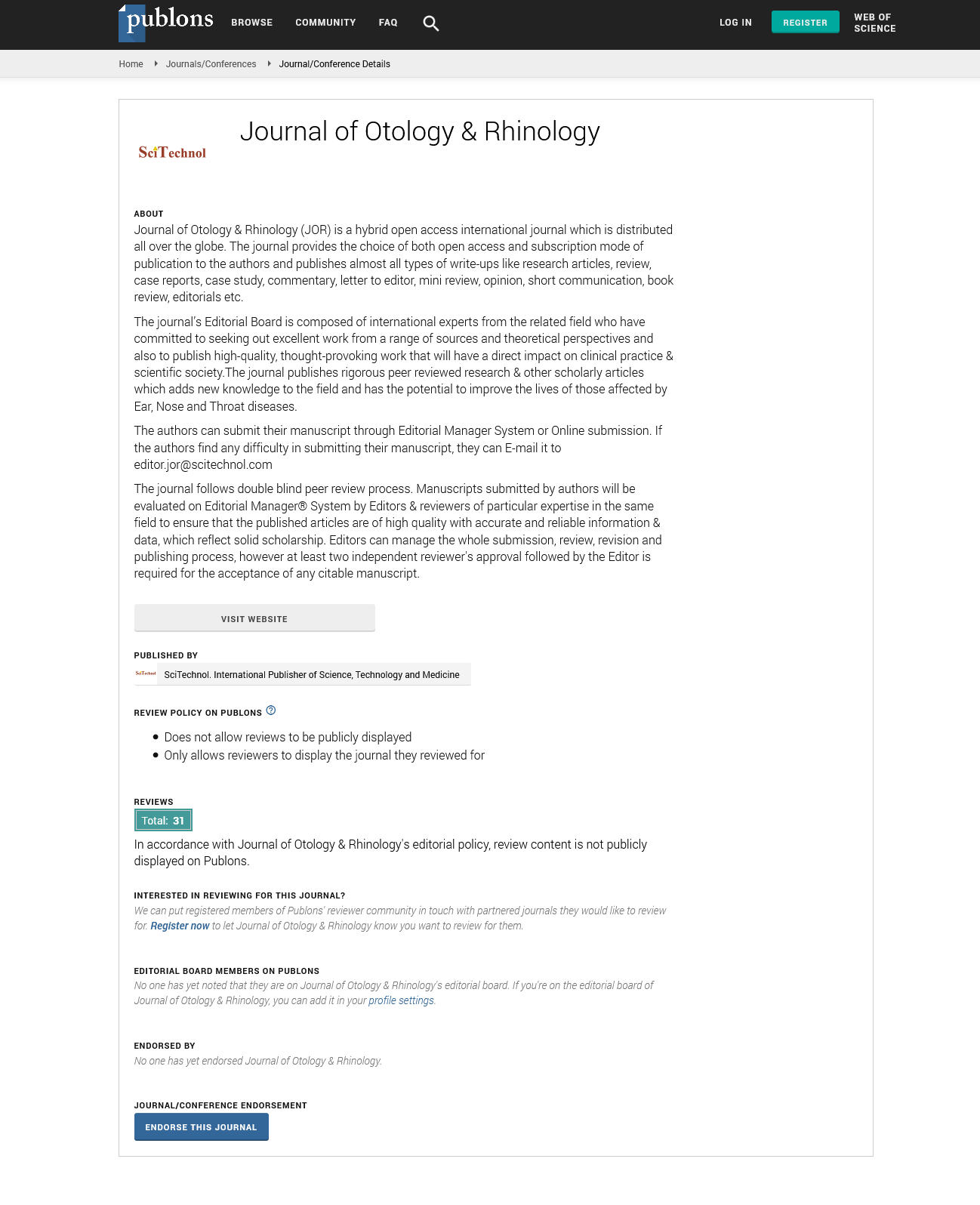Perspective, J Otol Rhinol Vol: 12 Issue: 2
Anosmia: The Invisible Sense Loss and Its Impact on Daily Life
Ghanaym Kanaan*
Department of Neurology, University of Liverpool, Merseyside, United Kingdom
*Corresponding Author: Ghanaym Kanaan
Department of Neurology, University of Liverpool, Merseyside, United Kingdom
E-mail: kanaanghanaym@gmail.com
Received date: 20 February, 2023, Manuscript No. JOR-23-95105;
Editor assigned date: 22 February, 2023, PreQC No. JOR-23-95105 (PQ);
Reviewed date: 08 March, 2023, QC No. JOR-23-95105;
Revised date: 15 March, 2023, Manuscript No. JOR-23-95105 (R);
Published date: 22 March, 2023, DOI: 10.4172/2324-8785.100052
Citation: Kanaan G (2023) Anosmia: The Invisible Sense Loss and Its Impact on Daily Life. J Clin Image Case Rep 12:2.
Description
Anosmia is a condition characterized by the partial or complete loss of the sense of smell. It can be temporary or permanent and can occur due to various causes such as viral infections, head injuries, nasal polyps, and certain medications. Anosmia can significantly impact an individual's quality of life, as it affects their ability to detect odors and taste food, as well as their ability to detect potential dangers such as spoiled food, gas leaks, or smoke.
The sense of smell plays a crucial role in daily lives. It is closely linked with emotions, memories, and social interactions. Smells can trigger memories, influences mood, and help us navigate to environment. The loss of this sense can have significant physical, emotional, and psychological effects on individuals with anosmia.
Physical and emotional impact of anosmia
The physical impact of anosmia goes beyond the loss of the ability to smell pleasant odors or enjoy food. It can affect an individual's overall health and well-being. Without the sense of smell, individuals may lose interest in food, experience changes in appetite, and have difficulty detecting spoiled or contaminated food, which can lead to poor nutrition and weight loss.
In addition, anosmia can affect an individual's ability to detect potential dangers in their environment. For example, they may not be able to smell gas leaks, smoke, or other harmful odors, which can put them at risk of accidents or injuries.
The emotional impact of anosmia should not be overlooked. The sense of smell is closely tied to emotions and memories. The loss of this sense can lead to emotional distress, anxiety, and depression. Individuals with anosmia may experience a reduced sense of pleasure in life and may have difficulty enjoying activities that were once pleasurable, such as cooking, eating out, or spending time in nature. They may also face challenges in social situations, as smell plays a significant role in ability to detect body odor, perceive attractiveness, and bond with others.
Coping with anosmia strategies and support
Although anosmia can have a significant impact on daily life, there are strategies and support available to help individuals cope with this condition. Here are some approaches that can be helpful:
Seeking medical evaluation: If anyone suspect anosmia, it is crucial to seek medical evaluation to determine the underlying cause. Treatment options may vary depending on the cause of anosmia, and early intervention can be critical in some cases.
Safety measures: Taking safety measures to compensate for the loss of smell can be important.ss Installing smoke detectors and gas detectors in home, checking expiration dates on food products, and relying on visual cues for potential dangers can help minimize risks.
Taste retraining: Since the sense of smell and taste are closely connected, taste retraining can be helpful in some cases of anosmia. Working with a healthcare professional, individual can learn techniques to enhance their sense of taste and enjoy food more fully.
Emotional support: Seeking emotional support from friends, family, or a mental health professional can help individuals cope with the emotional impact of anosmia. Talking about their feelings, fears, and concerns, and finding healthy ways to manage emotions can be beneficial.
Lifestyle adjustments: Adjusting to a life with anosmia may require some lifestyle changes. For example, individuals may need to be more vigilant about food safety, be cautious about personal hygiene, and pay closer attention to visual cues in their environment. Anosmia is a condition that can significantly impact an individual's physical, emotional, and social well-being.
 Spanish
Spanish  Chinese
Chinese  Russian
Russian  German
German  French
French  Japanese
Japanese  Portuguese
Portuguese  Hindi
Hindi 


